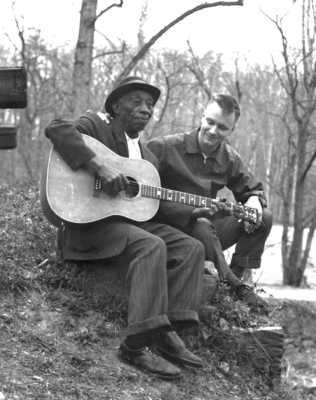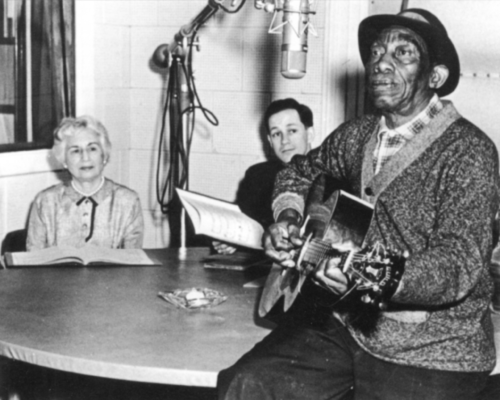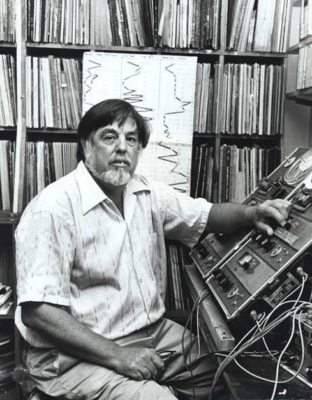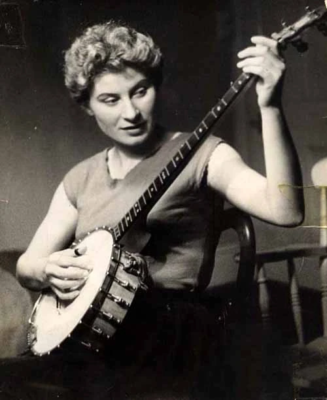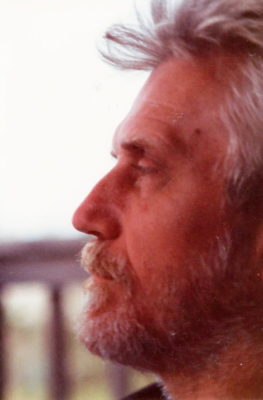In this column: nicknames, stage names, Memphis Minnie, Little Son Joe, Memphis, Mickey Baker, Mississippi John Hurt, Mississippi Fred McDowell, Texas Alexander, Little Hat Jones, Georgia Tom Dorsey, Kansas City Red, Carolina Slim, Tallahassee Tight, Spark Plug Smith, Honeyboy Edwards, Robert Johnson, Dick Spottswood, Tom Hoskins, Alan Lomax, Shirley Collins, Christian Garrison
Introduction
Stage names with a geographic background.
Lizzie "Memphis Minnie" Douglas
Minnie was a blues guitarist, vocalist, and songwriter whose recording career lasted for over three decades. She recorded around 200 songs, some of the best known being "When the Levee Breaks", "Me and My Chauffeur Blues".
Her parents nicknamed her Kid when she was young. When she first began performing, she played on Beale Street in Memphis under the name Kid Douglas.
She began performing with Kansas Joe McCoy, her second husband, in 1929. They were discovered by a talent scout for Columbia Records, in front of a barber shop, where they were playing for dimes. She and McCoy went to record in New York City and were given the names Kansas Joe and Memphis Minnie by a Columbia A&R man.
In July 1935 she recorded a session for Bluebird in October, this time accompanied by Casey Bill Weldon, her first husband. In 1938 she married the guitarist and singer Ernest Lawlars a.k.a. Little Son Joe. They began recording together in 1939, with Son adding a more rhythmic backing to Minnie's guitar. By 1941 Minnie had started playing electric guitar, and in May of that year she recorded her biggest hit, "Me and My Chauffeur Blues".
Memphis Minnie and Little Son Joe – Me and my chauffeur (1941)
John Len "Memphis Slim" Chatman
Chatman was an American blues pianist, singer, and composer. He led a series of bands. A song he first cut in 1947, "Every Day I Have the Blues", has become a blues standard (see also page).
He spent most of the 1930s performing in honky-tonks, dance halls, and gambling joints in West Memphis, Arkansas, and southeast Missouri. He settled in Chicago in 1939 and began teaming with the guitarist and singer Big Bill Broonzy in clubs soon afterwards. After World War II, Slim began leading bands that generally included saxophones, bass, drums, and piano, reflecting the popular appeal of jump blues. Slim first appeared outside the United States in 1960, touring with Willie Dixon, with whom he returned to Europe in 1962 as a featured artist in the first of the series of American Folk Festival concerts organized by Dixon, which brought many notable blues artists to Europe in the 1960s and 1970s.
In 1962, Slim moved permanently to Paris, and his engaging personality and well-honed presentation of playing, singing, and storytelling about the blues.
Memphis Slim & Mickey Baker – 3 songs: Rockin the House, Animal in Me, I’m Lost Without You (filmed at Le plateau de Bouton Rouge, 1968)
John Smith "Mississippi John" Hurt
Hurt was raised in Avalon, Mississippi and taught himself to play the guitar around the age of nine. He worked as a sharecropper and began playing at dances and parties, singing to a melodious fingerpicked accompaniment. His first recordings, made for Okeh Records in 1928 and 29, were commercial failures, and he continued to work as a farmer.
Dick Spottswood and Tom Hoskins, blues enthusiasts, located Hurt in 1963 and persuaded him to move to Washington, D.C. He was recorded by the Library of Congress in 1964. This helped further the American folk music revival, which led to the rediscovery of many other bluesmen of Hurt's era.
Mississippi John Hurt – live recordings and interview (1960s)
"Mississippi" Fred McDowell
McDowell was born in Rossville, Tennessee. In 1928, he moved to Mississippi to pick cotton. He finally settled in Como, Mississippi, in 1940 or 1941 (or maybe the late 1930s), where he worked as a full-time farmer for many years while continuing to play music on weekends at dances and picnics.
Alan Lomax (roving folklore musicologist) and Shirley Collins recorded McDowell in 1959. With interest in blues and folk music rising in the United States at the time, McDowell's field recordings for Lomax caught the attention of blues record producers, and within a couple of years, he had finally become a professional musician and recording artist in his own right.
Christian Garrison’s wonderful 1969 Documentary about Mississippi Fred McDowell
Alger "Texas" Alexander
Alexander was an American blues singer from Jewett, Texas.
A short man with a big, deep voice, Alexander started his career performing on the streets and at parties and picnics in the Brazos River bottomlands, where he sometimes worked with Blind Lemon Jefferson. In 1927, he began a recording career that continued into the 1930s, recording sides for Okeh Records and Vocalion Records in New York, San Antonio, and Fort Worth.
Alexander did not play a musical instrument, and over the years he worked with a number of other artists, including King Oliver, Eddie Lang, Lonnie Johnson, Little Hat Jones, the Mississippi Sheiks, J. T. Smith, and Lightnin' Hopkins.
Texas Alexander and Little Hat Jones – Range in My Kitchen Blues (Remastered)
Thomas Andrew "Georgia Tom" Dorsey
Dorsey was an American musician, composer, and Christian evangelist influential in the development of early blues and 20th-century gospel music (see also).
Born in rural Georgia, Dorsey grew up in a religious family but gained most of his musical experience playing blues at barrelhouses and parties in Atlanta. He moved to Chicago and became a proficient composer and arranger of jazz and vaudeville just as blues was becoming popular. He gained fame accompanying blues belter Ma Rainey on tour and, billed as "Georgia Tom", joined with guitarist Tampa Red in a successful recording career.
Georgia Tom Talking in the 1930s
Arthur Lee "Kansas City Red" Stevenson
Red was an American blues drummer and vocalist who played a major role in the development of urban blues. He performed and recorded with many notable blues artists, such as David "Honeyboy" Edwards, Robert Nighthawk, Sunnyland Slim, and Walter Horton.
Stevenson was born in Drew, Mississippi. After making a short trip to Kansas City he became known as Kansas City Red. He moved to Chicago in the 1950s. He owned and operated well-known clubs on Chicago's West Side, such as the Boola Boola, the Shangri-La, and the Club Reno.
Kansas City Red (vocal and drums) – The moon is rising (1977, Nate Armstrong (harmonica), Eddie Taylor (guitar), Hayes Ware (bass)
Edward P. "Carolina Slim" Harris
Harris was an American Piedmont blues guitarist and singer. His best-known records are "Black Cat Trail" and "I'll Never Walk in Your Door". He used various pseudonyms during his brief recording career (he died aged 30), including Country Paul, Jammin' Jim, Lazy Slim Jim and Paul Howard. He recorded 27 songs.
Harris was born in Leasburg, North Carolina.
Carolina Slim – Blues Knocking At My Door (1950 -1952)
Louis "Tallahassee Tight" Washington (reportedly born Louis Jackson)
Washington was an American musician, performing both gospel music and blues.
He used his real name for his gospel singing, but apparently preferred to use Tallahassee Tight when singing blues. It is believed that he was from northwest Florida, based not only on his choice of nicknames, but also from several of his songs: Tallahassee Women, Quincy Wimmens, and Coast Line Blues. Quincy, Florida is approximately 20 miles from Tallahassee, and the Coast Line refers to the Seaboard Air Line Railroad which passes through Tallahassee.
In 1995, an album was released by Document Records of the music of Louis Washington/Tallahassee Tight and Spark Plug Smith. The album indicates that the music was originally recorded in 1933 and 1934.
Spark Plug Smith & Tallahassee Tight – Tallahassee Women (1933-1934)
Spark Plug Smith
Country blues singer and guitarist, who recorded twenty titles for ARC (ten of which remain unissued) in 1933. Little to nothing is known about the mysterious Spark Plug Smith. Just as a “spark plug” brings a car engine to life, the male genitalia can “bring life” to a woman. Some musicians are insatiable womanizers and chose nicknames to show it off.
Examples of that type of nicknames: Frank "Springback" James (Springback was a nickname hinting at the owner's tireless sexual prowess), Bumble Bee Slim (see), Jelly Roll Morton (see), David Honeyboy Edwards and some Papa's (in the sense of "come to papa", usually gets all the girls that sit in front of him, isn't shy at all to talk to girls).
Spark Plug Smith – Mama Let Me Lay It On You (1936)
David "Honeyboy" Edwards (Honey Eddie, Mr. Honey)
Edwards was an American delta blues guitarist and singer from Mississippi.
He performed with the famed blues musician Robert Johnson, with whom he developed a close friendship. Edwards was present on the night Johnson drank the poisoned whiskey that killed him, and his story has become the definitive version of Johnson's demise.
The folklorist Alan Lomax recorded Edwards in Clarksdale, Mississippi, in 1942 for the Library of Congress. Edwards recorded 15 album sides of music, he did not record commercially until 1951, when he recorded "Who May Be Your Regular Be" for Arc under the name Mr. Honey.
Honeyboy = a guy who is sweet, funny and sexy at the same time.
Honeyboy Edwards playing on a street corner in 1942
Honey Boy Edwards Talks About Robert Johnson’s Death
Musicologists involved in this episode
